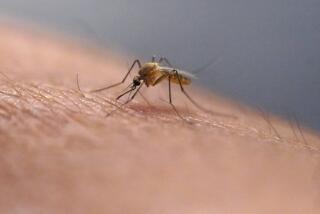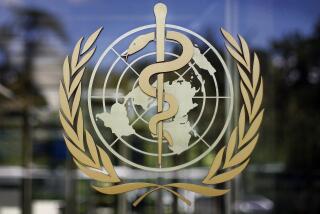100-plus swine flu cases confirmed outside Mexico
As isolated outbreaks of swine flu continue to be confirmed around the world, with new cases reported Tuesday in Canada, Israel, France, New Zealand, Costa Rica and South Korea, Gov. Arnold Schwarzenegger proclaimed a state of emergency and the White House asked Congress for an additional $1.5 billion to fight the outbreak.
State health officials have been aggressively working to address the crisis, and the proclamation is one more step in that effort, not an indication that the outbreak in California has become more severe.
In the U.S. and elsewhere, officials are holding their breath to see whether the virus’ spread will turn into something more severe or, as many hope, peter out. Meanwhile, like Schwarzenegger, they are responding aggressively.
President Obama, in a letter to Congress, asked for the $1.5 billion with “maximum flexibility to allow us to address this emerging situation.” The letter said the money could go toward stockpiling antiviral medicine, vaccine development, disease monitoring and diagnosis, and assisting international efforts to limit the spread of swine flu.
“In our opinion, this is about prudent planning moving forward,” White House Press Secretary Robert Gibbs told reporters.
Also Tuesday, Homeland Security Secretary Janet Napolitano said she was forming a swine flu task force to coordinate U.S. efforts and noted that the government had made 12 million doses of antiviral drugs available to states. She said her agency was resisting calls from Capitol Hill to screen inbound air travelers from Mexico and those crossing at border checkpoints.
“Our focus is not on closing the border or conducting exit screening,” she said. “It is on mitigation.”
The total number of confirmed swine flu cases in the United States had reached 68 as of late Tuesday afternoon and more than 100 worldwide, not counting the still-unknown number of cases in Mexico. At least some of the new cases appear to have come from human-to-human transmission outside Mexico.
Such community transmission is one of the early earmarks of a pandemic, and if it continues to be observed, experts predicted, the World Health Organization is likely to raise its alert to Level 5, from elevated Level 4. Such an increase might involve more travel restrictions and stronger efforts to control the spread of the virus.
At a Tuesday morning news conference in Geneva, Dr. Keiji Fukuda, assistant director-general of the WHO, said a pandemic was not inevitable, but that if one did occur it was likely to be mild -- a conclusion drawn from the lack of deaths outside Mexico.
But he cautioned that the 1918 Spanish flu pandemic, which killed millions worldwide, also started out mild. In the spring of that year, a mild pandemic petered out, only to return with a vengeance in the fall.
“I think we have to be mindful and respectful of the fact that influenza moves in ways we cannot predict,” he said.
Moreover, he added, it is unlikely that health authorities will be able to limit the current outbreak’s spread. “At this time, containment is not a feasible option,” he said.
One ray of good news is that the outbreak may be leveling off in Mexico, where the first cases appeared. Mexican Health Minister Jose Angel Cordova said Tuesday that the number of new suspected cases of swine flu had declined from 141 on Saturday to 119 on Sunday and 110 Monday.
At least 159 people have died in Mexico from influenza and its complications, and more than 2,000 cases have been reported. It is not clear, however, what proportion of those deaths and cases are attributable to swine flu. So far, only 26 of the deaths have been firmly linked to the virus.
Mexican authorities ordered all restaurants in Mexico City to begin serving only take-out food in an effort to limit spread of the virus, and they closed down archaeological sites in an effort to limit assemblies of people. Officials had already requested that bars, movie theaters, pool halls, gyms and churches in the capital close. Schools nationwide are closed until May 6.
The Mexico City Chamber of Commerce estimated that Mexico City is losing approximately $60 million a day from reduced tourism, trade and other business.
Mexican authorities were still trying to pinpoint where the disease started. They say they have found no infected pigs in the country, although a boy who lives near a pig farm in the state of Veracruz was confirmed to have contracted the disease as early as April 1. His community is also a largely migrant community, with people traveling to and from the U.S. regularly.
“Where did the virus come from? We don’t know. Did someone come from California or did someone go from Mexico to California? We don’t have that information,” Cordova said.
As more countries around the world warned against unnecessary travel to Mexico, soccer’s regional governing body, CONCACAF, said it was canceling a beach soccer tournament scheduled in Puerto Vallarta today. The group had already suspended an under-17 tournament, the semifinals of which were to be played today in Tijuana.
Two new confirmed swine flu cases were reported in Sacramento County on Monday evening, bringing the California total to 13. In the wake of that announcement, the governor’s emergency proclamation orders all agencies and employees to provide all possible assistance to the Department of Public Health, authorizes that department to enter any necessary contracts for materials and services to combat the outbreak, makes it easier to purchase materials and waives some certification requirements for public health laboratories.
In Indiana, one case was reported Tuesday, a young adult in the northern part of the state.
Three new cases were also confirmed in Texas, bringing that state’s total to six, and 17 probable cases in New York were confirmed. Authorities had previously confirmed 28 cases in New York, two in Kansas and one in Ohio, and more confirmations are expected hourly as testing continues.
New York City health officials also said that two people with swine flu symptoms, unconnected to the well-publicized outbreak at St. Francis Preparatory School in Queens, have been hospitalized.
All the previous confirmed U.S. cases have been mild, but five of them now involve hospitalizations, three in California and two in Texas, said Dr. Richard Besser, acting director of the Centers for Disease Control and Prevention.
There have been no known deaths from the virus outside Mexico. The Los Angeles County coroner’s office had said it was investigating two deaths thought to be linked to swine flu, but in a statement Tuesday said no links could be found.
“We still do not have a good explanation for why the pattern of cases in other countries appear relatively mild while the pattern of cases in Mexico appear to be much more severe,” Fukuda said. “This will be the object of a great deal of research and attention, but at this time we can’t say why there appears to be a difference.”
U.S. officials said more severe cases in this country were likely. “I fully expect we will see deaths from this infection,” Besser said. All types of flu kill people, experts said, and there was no reason to believe this one should be different.
New Zealand authorities said that 13 residents who had recently traveled to Mexico showed symptoms of the virus. Swine flu was confirmed in three, and the authorities are assuming that all have it, Health Minister Tony Ryall said. The number broadened to include another traveler from North America.
Canadian officials said seven new cases had been confirmed in that country, bringing its total to 13.
Israel’s Health Ministry confirmed two cases in that country among travelers, and Spain confirmed a second case there. South Korean authorities said they had found a probable case there in a recent visitor to Mexico. There was also a confirmed case in Costa Rica and a probable case in France.
Two cases had previously been confirmed in Britain.
All of the foreign cases have been mild, but the victims have been hospitalized for quarantine, in light of fears about the spread of the virus.
Also Tuesday, Cuba became the first country to suspend flights to and from Mexico, ordering a 48-hour cessation. Mexico is a major transit point for flights to that isolated country, which has not yet reported any cases of swine flu. Argentina subsequently canceled all flights to and from Mexico for five days.
Carnival and Royal Caribbean cruise lines said their ships would not stop in Mexico until at least next week.
--
Jim Tankersley in the Washington bureau and Times staff writer Tracy Wilkinson in Mexico City contributed to this report.
--
(BEGIN TEXT OF INFOBOX)
The toll
Confirmed swine flu cases as of 8 p.m. Tuesday, PDT:
United States: 68
New York: 45
California: 13
Texas: 6
Kansas: 2
Ohio: 1
Indiana: 1
Mexico: 26*
Canada: 13
New Zealand: 14
Scotland: 2
Israel: 2
Spain: 2
Costa Rica: 1
* As many as 6,000 have symptoms
Sources: Centers for Disease Control and Prevention, World Health Organization, Associated Press
More to Read
Sign up for Essential California
The most important California stories and recommendations in your inbox every morning.
You may occasionally receive promotional content from the Los Angeles Times.










